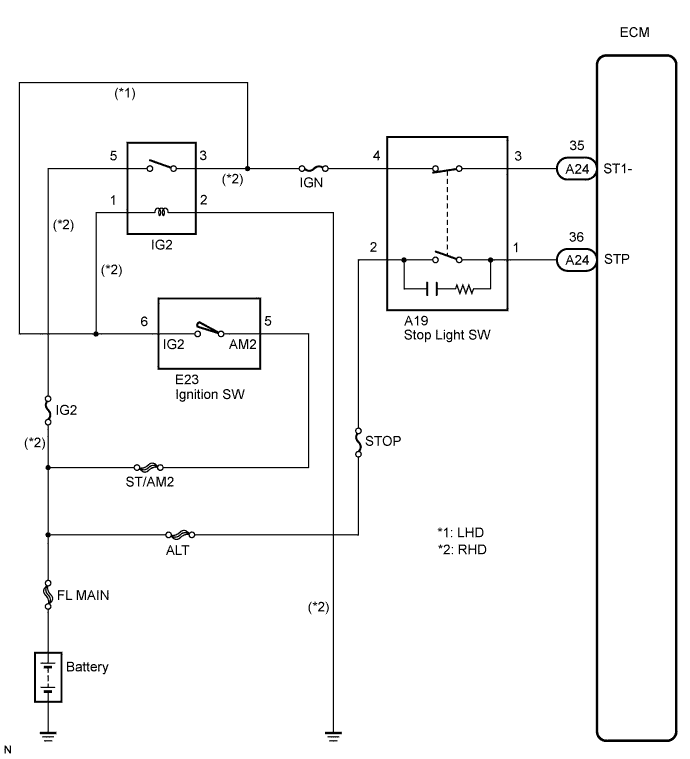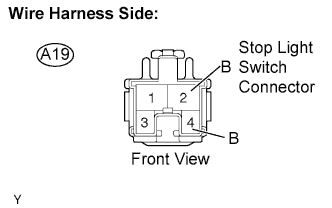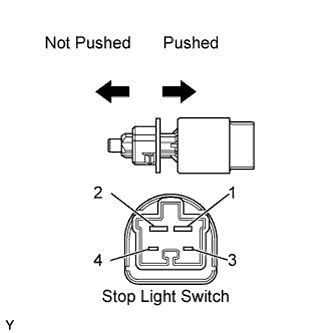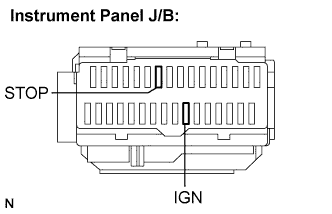Dtc P0504 Brake Switch A / B Correlation
DESCRIPTION
WIRING DIAGRAM
INSPECTION PROCEDURE
CHECK STOP LIGHT SWITCH (TERMINAL VOLTAGE)
INSPECT STOP LIGHT SWITCH
CHECK ECM (STP AND ST1 - VOLTAGE)
INSPECT FUSE (STOP AND IGN FUSES)
DTC P0504 Brake Switch "A" / "B" Correlation |
DESCRIPTION
The stop light switch is a duplex system that transmits two signals: STP and ST1-. These two signals are used by the ECM to monitor whether or not the brake system is working properly. If the signals, which indicate the brake pedal is being depressed and released, are detected simultaneously, the ECM interprets this as a malfunction in the stop light switch and sets the DTC.- HINT:
- The normal conditions are as shown in the table below. The signals can be read using the intelligent tester.
Signal
| Brake Pedal Released
| In Transition
| Brake Pedal Depressed
|
STP
| OFF
| ON
| ON
|
ST1-
| ON
| ON
| OFF
|
DTC No.
| DTC Detection Condition
| Trouble Area
|
P0504
| Conditions (a), (b) and (c) continue for 0.5 seconds or more
(1 trip detection logic):
(a) Ignition switch to the ON position
(b) Brake pedal released
(c) STP signal OFF when ST1- signal OFF
| - Short in stop light switch signal circuit
- Stop light switch
- STOP fuse
- IGN fuse
- ECM
|
WIRING DIAGRAM
INSPECTION PROCEDURE
- HINT:
- Read freeze frame data using the intelligent tester. The ECM records vehicle and driving condition information as freeze frame data the moment a DTC is stored. When troubleshooting, freeze frame data can help determine if the vehicle was moving or stationary, if the engine was warmed up or not, if the air-fuel ratio was lean or rich, and other data from the time the malfunction occurred.
- STP signal conditions can be checked using the intelligent tester.
- Connect the intelligent tester to the DLC3.
- Turn the ignition switch to the ON position and turn the tester on.
- Select the following menu items: Powertrain / Engine and ECT / Data List / Stop Light Switch.
- Check the STP signal when the brake pedal is depressed and released.
Brake Pedal Operation
| Specified Condition
|
Depressed
| STP signal ON
|
Released
| STP signal OFF
|
| 1.CHECK STOP LIGHT SWITCH (TERMINAL VOLTAGE) |
Disconnect the A19 stop light switch connector.
Turn the ignition switch to the ON position.
Measure the voltage between the terminals of the stop light switch connector and body ground.
- Standard voltage:
Tester Connection
| Specified Condition
|
B (A19-2) - Body ground
| 9 to 14 V
|
B (A19-4) - Body ground
| 9 to 14 V
|
Reconnect the stop light switch connector.
| 2.INSPECT STOP LIGHT SWITCH |
Remove the stop light switch.
Measure the resistance between the terminals.
- Standard resistance:
Tester Connection
| Switch Position
| Specified Condition
|
1 - 2
| Switch pin not pushed
| Below 1 Ω
|
Switch pin pushed
| 10 kΩ or higher
|
3 - 4
| Switch pin not pushed
| 10 kΩ or higher
|
Switch pin pushed
| Below 1 Ω
|
Reinstall the stop light switch.
| 3.CHECK ECM (STP AND ST1 - VOLTAGE) |
Disconnect the A24 ECM connector.
Turn the ignition switch to the ON position.
Measure the voltage between terminals ST1- and STP of the A24 ECM connector and body ground.
- Standard voltage:
Tester Connection
| Brake Pedal Operation
| Specified Condition
|
ST1- (A24-35) - Body ground
| Released
| 9 to 14 V
|
Depressed
| Below 1.5 V
|
STP (A24-36) - Body ground
| Released
| Below 1.5 V
|
Depressed
| 9 to 14 V
|
Reconnect the ECM connector.
| | REPAIR OR REPLACE HARNESS OR CONNECTOR |
|
|
| 4.INSPECT FUSE (STOP AND IGN FUSES) |
Remove the STOP and IGN fuses from the instrument panel J/B.
Measure the resistance.
- Standard resistance:
- Below 1 Ω
Reinstall the STOP and IGN fuses.
| | REPLACE FUSE (STOP AND/OR IGN FUSES) |
|
|
| OK |
|
|
|
| REPAIR OR REPLACE HARNESS OR CONNECTOR (BATTERY - STOP LIGHT SWITCH) |
|




